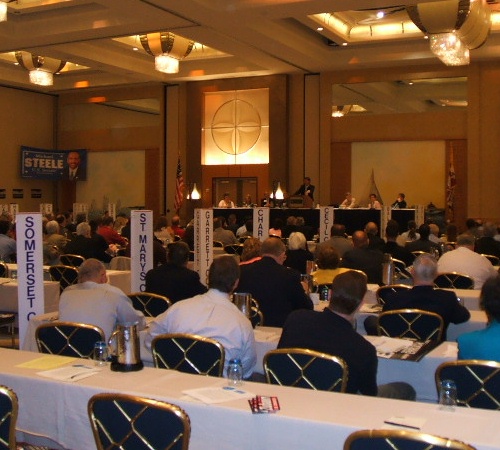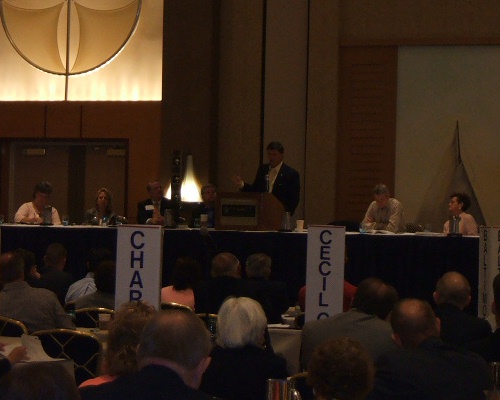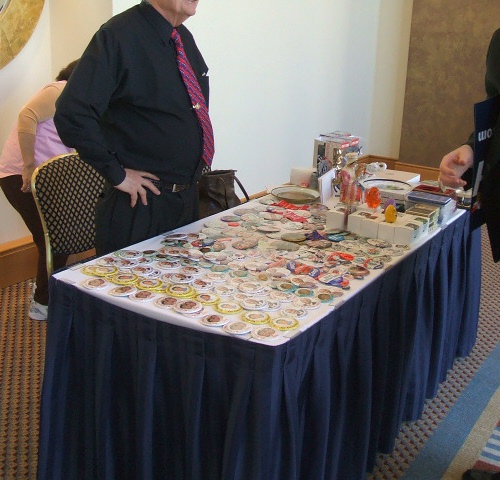
Jack Lord saw me here today and figured he’d be seeing the report in monoblogue…he was right!
This was the scene today just up the road in Cambridge at the Hyatt resort. While it was a beautiful morning along the Choptank River, almost 200 members of the various local Central Committees, candidates, and interested observers (like myself) sat in the convention hall to listen to the Party go about the nuts and bolts of its business.
Much as a meeting of the Wicomico County Republican Club (you can look in the archives for my reports on those), state chairman John Kane began the meeting by leading us all in the Pledge of Allegiance, along with observing a moment of silence for prominent Republicans who had passed away since the previous fall’s convention.
He then introduced the Republican candidate for Maryland Attorney General, Frederick County State’s Attorney Scott Rolle. After 12 years in that post, he decided to make the run for statewide office and was a beneficiary of current Attorney General Joe Curran’s decision not to seek re-election. At stake in this election is a streak of Democrat Attornies General that dates back to 1919.
Rolle emphasized the main points of his campaign would be dealing with kids and gangs; more specifically, a focus on crimes against children and working to combat the increasing gang influence in Maryland – a law and order Attorney General moreso than the incumbent. Captain Rolle also talked of his Army Reservist stint, which included defending Sgt. Michael J. Smith, who was convicted of using his dog to intimidate prisoners at Abu Ghraib prison in Iraq.
Instead of going to prison, Rolle said, Smith should be getting a medal pinned to his chest. This line brought an ovation from the gathering, including myself.
The keys to his campaign, Scott noted, would be name recognition and money. Not being from the main populated area of Maryland puts him at some early disadvantage on that, but initial signs were positive that the campaign would be successful.
After Rolle spoke, the meeting again turned to business, with various committees informing the meeting of their particular facets of the Party’s workings. Once complete, Kane gave his chair’s report.
His report stressed discipline – the Democrats would try to promote infighting among the Republicans, who would work best if they stayed focused on the overall goal. He also gave the assemblage word that, for the first time in many years, Maryland wouldn’t be written off by the national GOP. We’ll actually get some help from the national party because of the two high-profile races we have with Governor Ehrlich seeking reelection and Lieutenant Governor Steele looking to advance to the U.S. Senate.
Kane also took a few moments to question the wisdom of two pieces of legislation passed by the General Assembly, vetoed by Gov. Ehrlich, and overrode by the heavy Democrat majority. One was the “early voting” bill, where Democrats picked out the polling places that would open five days prior to the election. Claiming the bill was “fraught with fraud”, the chair also informed us that, of all the states that permitted early voting, Maryland was the sole state NOT requiring identification.
The other law is interesting. It was written by the Democrats to target one person, a gentleman by the name of Dick Hug. The legislation prohibits political fundraising by members of a college board of regents. As it so happens, Governor Ehrlich’s chief fundraiser was on the University of Maryland’s board, but had to resign last week due to this law. Even the regents who worked with Hug objected to forcing him from the board – but the law is the law.
The way I see it, legislation to punish success is terrible anyway. But had the law been passed to apply solely to any future appointees rather than those already in office, I wouldn’t be objecting to it so much nor would most people. But the Democrats in Annapolis have a problem with spite. They seem to have the attitude that they are entitled to rule the Free State as a personal fiefdom, and though the state elected a Republican governor it’s viewed as a fluke.
Back to the business at hand. After Chairman Kane finished, the national committeewoman, Joyce Terhes, gave her rendition of the state committee report. She was quite fired up, exhorting the attendees to leave “furious.” She was adamant about the media diminishing the accomplishments of the Ehrlich administration, and accused the Democrats, stating that they “can’t beat the governor legally” as she ripped into the early voting law.
After her remarks, Kane came back to introduce the next speaker but did comment on Terhes’ speech, adding that the early voting laws were “nothing but a screw job.” And he’s right, since the law as written has many flaws in it. It went back to another thing Terhes stated in her remarks where states with early voting are finding that turnout is not increasing as much as expected anyway. Add in the lack of an ID requirement and it’s no wonder that many, even the partisan media (in our case, the Baltimore Sun and Washington Post, neither friends of Governor Ehrlich) question the wisdom of our state’s early voting law.
Lewis Pope was the last of the committee speakers, he is the national committeeman. He devoted his time to the national scene. His message: turnout is important. (Duh!) Seriously, the party does need to get out the base. He also criticized the Democrats as a “party without strategy.”
Pope quoted the famous James Carville statement from 1992, “it’s the economy stupid.” But his twist on it was that no one is reporting on the good economic news. The accomplishments of the last five years economically aren’t being echoed as much as the boom in the nineties was.
Additionally, Pope cited the rise of black Republicans like Ken Blackwell in Ohio and Lynn Swann in Pennsylvania, not to mention our Michael Steele. Here I sort of depart from the party line in a way, because to me they are conservative Republicans, not African-American conservative Republicans. I’m not one who prides myself on seeking an artificial diversity, I just accept people as people. I liked Ken Blackwell in Ohio because he was a fiscal conservative and I couldn’t have cared less how much pigment he had.
But Pope also noted that he was the guy who was filler for the main speaker.

It was at this point that Governor Ehrlich arrived to a sign-waving, thundering standing ovation from the crowd, much as an annointed Presidential candidate would at the national convention. First of all, Ehrlich talked about some of the large and enthusiastic crowds he had seen at the party’s Lincoln Day dinners at various locations around the state. As part of his remarks later, he cited two key accomplishments: turning a $4 billion deficit he inherited into a $2 billion surplus while shrinking the size of government by 7%; and educational spending that assisted in improving the test scores for schools in 23 of 24 Maryland jurisdictions (more on that other one in a moment.) Included in his successes was the establishment of 30 charter schools in Maryland, despite objections from the teachers’ unions.
But his most passionate words were for what he called targeting empowerment. One program he was most proud of was an initiative to rehabilitate criminals, saying that the term “throw away the key is not a period, it’s a semicolon.” At some point, he continued, criminals do get out. So while they are incarcerated, it’s best in his eyes to assist them by treating their mental health and drug issues. It’s a program he wanted to expand, but Democrats in Annapolis stood in his way.
And while it might peg me as a squishy moderate, I can understand his point. There’s a vast number of people in jail who are there for making one stupid decision – maybe they consumed too much alcohol and caused a fatality while driving drunk; or they just happened to be in the car with others who robbed the gas station. If this is so, it is probably best to work to rehabilitate them, knowing the older and wiser people likely won’t make another mistake to land them in the state prison system. Obviously a hardcore murderer with a long record of criminal activity is a different story, they’ve been proven as a danger to civilized society.
Ehrlich also made the claim that the Democrats have tried to raise taxes by $7.5 billion while he was in office, but he managed to fend off those tolls on the hardworking citizens of Maryland. Further, he touched on the issue of minority business enterprises and his efforts to help those entrepreneurs out. But he cautioned that his administration is “not in the business of guaranteeing results, but guaranteeing opportunity.” This is all well and good, but it is one part of the Ehrlich administration I disagree with, again because I try to stay colorblind in that area. I don’t believe in discrimination for or against a certain race, religion, gender, or preference. To me, MBE’s are discrimination for the minority who simply got additional pigment.
The governor also issued four challenges that he and his administration try to address.
The first challenge is to “convince voters to operate outside their ‘comfort zone.’ ” Issues aren’t necessarily “Republican” or “Democrat” issues, they’re just issues that need to be addressed for the betterment of all the state’s citizens.
Second, understand the target audience. There’s a great number of moderate to conservative Democrats (yes, we still have a few “blue dogs” in Maryland) who pulled the lever in 2002 because he spoke to them on enough issues to convince them to vote for Ehrlich – I still occasionally see a “Democrat for Ehrlich” bumper sticker from four years ago. (This is particularly true of Eastern Shore voters, who heavily went for Ehrlich across party lines in 2002.) But the far left Democrats will not vote for any Republican and that has to be accounted for too.
Thirdly, compare and contrast the Maryland of 2002 against the Maryland of 2006. I heard that and immediately thought of President Reagan asking, “are you better off than you were four years ago?” In my case, yes. But I didn’t live in Maryland in 2002.
And finally, a challenge that seemed strange on first hearing but made sense after some thought. It’s engaging the problem, and if a mistake is made, let it be an aggressive mistake. Don’t make a “status quo” mistake. I look at it as saying to try different ideas and think outside the box – sometimes your failure is spectacular, but it did prove the point that the solution would not work, and the experience is a teacher. Don’t keep doing the same old thing that’s not working just because it’s all you know. I would cite the twin examples of Thomas Edison (how many screwups do you think he had before he found tungsten wire works for a light bulb?) and Henry Ford (who I believe named his earliest prototype vehicles in alphabetical order, thus the Model T had a lot of flawed predecessors.)
Another passionate portion of the address was Ehrlich’s thoughts on the Baltimore City Schools. This district is the one district that did not improve, so state law allowed a takeover of the district. This takeover was thwarted by the Annapolis Democrats, who didn’t want that slap at the teachers’ union in an election year. In fact, Ehrlich quoted some (unnamed) Democrats and the excuses they gave as to why they would vote to override his veto. Most pathetic to him was the one who told the governor he couldn’t support the veto because, “the AFL-CIO told me not to.” While Ehrlich waxed eloquent about how the unions helped to build Maryland while he was growing up, and union jobs enabled those who had them to acquire the means for their children to have a better life, he felt betrayed that the same unions wanted to condemn the schoolchildren of Baltimore simply to regain political power.
He concluded that, “(his administration is) about empowerment”, and said that the 10,000 dropouts from the 11 takeover target schools in Baltimore City over the last nine years were “a state failure.” One effort his administration was making was attempting to track what happened to these dropouts as far as criminal activity, employment, etc. Again, I have to disagree with the governor on the dropouts, because the state can only set the rules regarding truancy and help pay to provide the buildings and equipment where there’s an opportunity to learn – it is up to each individual student whether they want to take advantage of that chance or not. Some beat the odds stacked against them and prosper due to sheer will.
After Ehrlich left to another standing ovation, Howard County committeeman Anthony Wisniewski raised his hand. Upon being recognized by the chair, he made some remarks about being fired up by the proceedings. Thinking back to his Jesuit education, he advised the gathered GOP faithful that they need to “justify and defend your decision” to support the party. The impromptu remarks were an interesting prelude to what came next.
The agenda was suspended for debate on a change to the party by-laws that was deemed necessary to be enacted now, rather than wait for the fall convention. This change involved replacing the three vice chairs with regional vice chairs selected from each of five districts: northern, southern, central, western, and Eastern Shore. Some controversy erupted over the placement of some counties in odd districts (an example is the mostly rural southern region also including suburban Anne Arundel County), but the main gist of the debate centered on an issue that creates tension in any legislative body.
There were some who favored the change because it needed to be expedited, but others cautioned that they really had no idea what was being voted on, as the context was missing. This measure was rather quickly written up, and many’s the bad law written in haste, they said. It was sausage grinding at its finest as an amendment to table was defeated after a fashion, then other friendly amendments debated and voted on. Finally, after nearly an hour of discussion and wrangling back and forth, the proposal as amended received the blessing of the state convention.
As it turned out, I was situated between a couple of interesting people. Sitting in the back, I happened to have the aforementioned Dick Hug to my left (strange to have him recognized during the chair’s remarks – hey everyone was looking at me too then!) and to my right was the graceful and gracious candidate for District 38B, Bonnie Luna (with her husband Louis.) As mentioned at the start, Jack Lord was also in attendance, he’s seeking one of those seats also.
I had a fleeting thought about being recognized as more than Dick Hug’s seating neighbor but thought better of it. At one point, Chairman Kane was asking if there were any media. I briefly considered raising my hand and asking, “does pajamas media count?” But I figured, better not. You never know, I might be more than an observer sometime.
I’m no stranger to political gatherings, one of my duties as president of the Toledo Metro Young Republicans was to represent our group at state functions. So I traveled to Columbus for our state convention (along with other Ohio cities for seasonal meetings.) As part of our state convention, we had a few vendors selling their wares. It’s the reason I snapped this picture – seems there’s always a button seller someplace at a state political function, and Maryland is no exception to the rule.

Overall, I enjoyed my morning there. I think the people in the GOP were genuinely excited about this fall – I know, I was in amongst the hardcore believers, but these are also the folks who are leaders in their home counties. It’s my thought that they are the backbone of America, most of them just plain folks who don’t get their names in the papers but do their best to contribute to American society.
Among those attending were some folks who had spent time with the Democrat side as part of their political jobs. To a person, they said that the Democrats seemed to be a gloomy bunch, only concerned with the negatives of what they feel is wrong with the Bush presidency instead of trying to come up with a positive alternative vision for what they wanted America to be.
Tonight I was chatting online with a friend of mine who is a Democrat. But there were a lot of issues where it appeared we have at least some common ground…both pro-America and tired of political games being played rather than results achieved. While I’m sure we differ over our vision of what government should do, we both agreed that there are political scoundrels who inhabit both major parties.
But what I saw today was a lot of honest and caring emotion. Yes, we as Republicans can be pretty mean-spirited toward our political opponents (Lord knows I am at times) but it’s because we do give a rat’s ass about our country and we consider it still the shining city on the hill. What today’s gathering attempted to do is get us working toward electing the people we feel would bring us closer to the Reaganesque vision of America and try to return our government to one of, for, and by the people, not the special interests.




